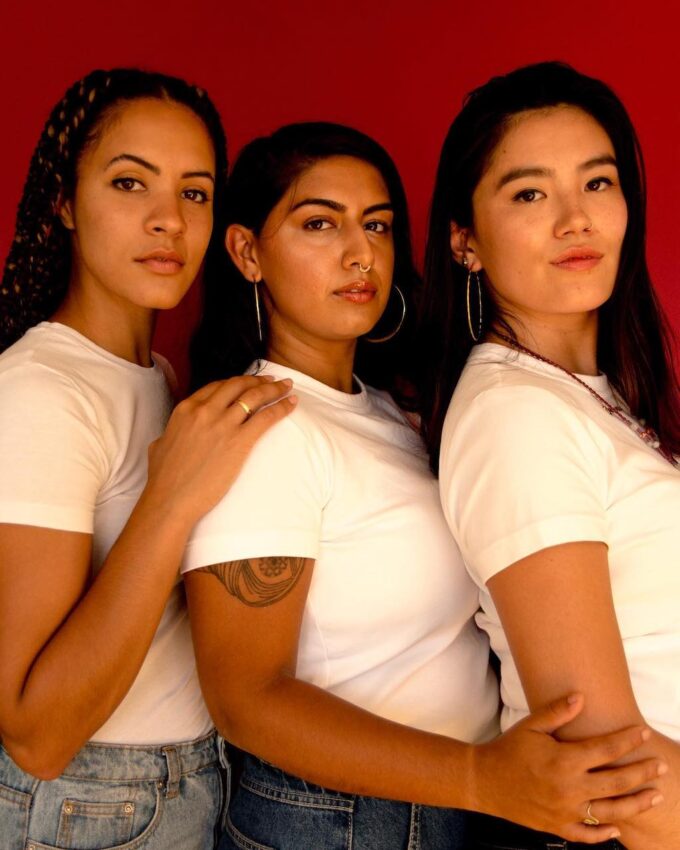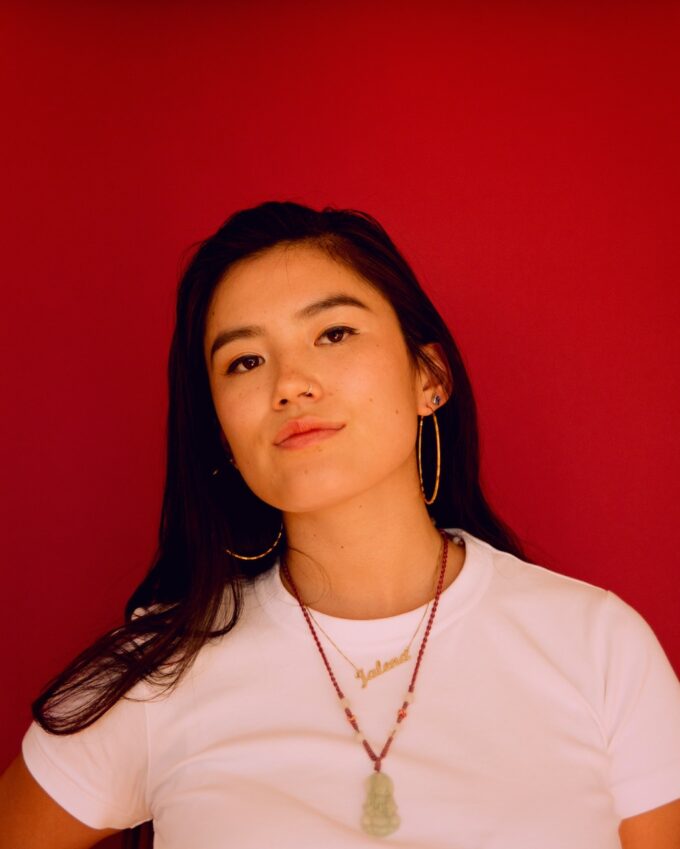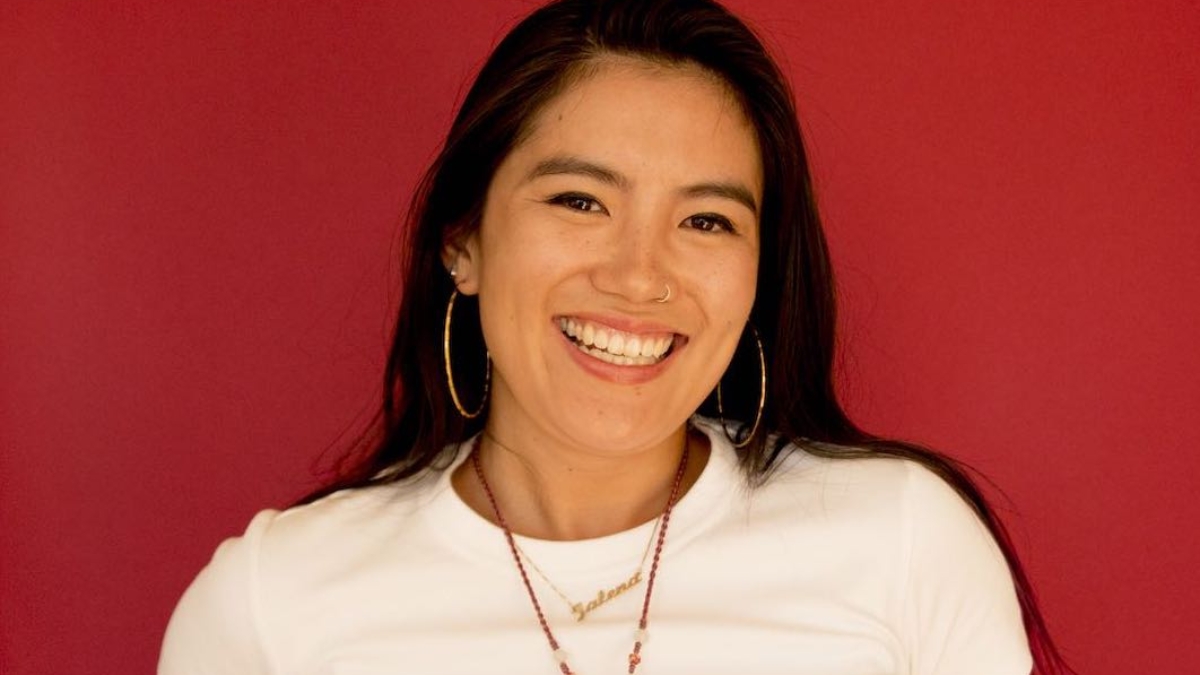Written By: Kano Umezaki
As we celebrate Asian/Pacific/American Heritage Month, I found it important to think about ways in which filmmaking can support the Asian American, Native Hawaiian and Pacific Islander (NHPI) community materially through coalitional resistance. Jalena Keane-Lee is a documentary filmmaker who centers her creative work around the intergenerational trauma, healing and resilience of the Asian/Pacific Islander diaspora. Her latest short film, “Standing Above the Clouds,” follows Native Hawaiian mother-daughter protectors of Mauna a Wakea as they resist the colonial construction site of the world’s largest telescope. The film was met with wide-spread acclamation, as it won Best Short at the Los Angeles Asian Pacific Film Festival and Melbourne Women in Film Festival, and was also nominated for Best Documentary Short at the National Film Festival for Talented Youth and Guam Film Festival.
She is currently working on a feature-length version of the film, which has garnered support from the Pacific Islanders in Communication, Nia Tero, CNN Films, and Points North Institute. She is also co-founder of Breaktide Productions, an all women of color production rooted in intersectional, transnational feminist solidarity, which was named YBCA’s 100 list of change-makers in 2019. Previously, she has been a NeXt Doc Fellow, Sally Burns Shenkman Woman Filmmaker Fellow at the Jacob Burns Film Center, and an Asian American Journalists Association fellow.
I had the chance to virtually chat with Jalena about embodied oral histories, matriarchal lineages, diasporic Asian identities, and long-held dreams. Her creative work and critical insights can hopefully ground us into thinking what documentary filmmaking can be when dedicated to building and sustaining community.
- Documentary films are often expected to be “authentic” in an uncritical, almost fetishitic, sense. I’m specifically thinking of feminist filmmaker Trinh T. Minh-ha, when she writes: “… it still happens that when I’m invited to speak, I’m asked with great expectations to speak as a representative — of a culture, a people, a country, an ethnicity or a gender considered to be mine and my own. In other words, tell us about Vietnam, be woman, talk Asian, stay within the Third World.” I’m interested in how you and your work challenge, or get frustrated by, the authorized boundaries defined by “authenticity”?
That’s a great question! I love that quote also. In terms of being seen as Asian American and female, it’s definitely not easy in the film space. Especially in this time, it’s hard to be an Asian woman in general. We’re often seen as submissive and weak, and these stereotypes get across in filmmaking. People always assume that I’m the translator or the assistant, or something like that. Being underestimated, it’s a double edged sword, especially in documentary filmmaking. It can be so hard, like when you’re trying to fundraise or get other institutional support, but it can be a blessing in production when you want to blend in or fly under the radar.
One thing I try to explore in my work, alongside helping keep culture alive, is giving depth and humanity to women leaders. Because we only see them when they’re giving a speech, or when they’re in power, so we don’t have a full picture of what that takes and what that’s like. I think it’s really important to have that. One, so future generations can know their ancestors in a well-rounded way, and know them as people, not just as individual speeches or moments. And also, to understand what is lacking when it comes to care systems for women leaders, especially when thinking about mother-daughter activism and motherhood and caregiving.
Being the director, being in charge, it returns a lot of agency to me. I try to do that with my films too. And that’s why I involve the people on-camera in the filmmaking and post-production process, because I want it to be something that returns agency to the people who the stories belong to. Documentary filmmaking was founded as something very extractive, so I hope to reclaim that.

- You are a co-founder of Breaktide Productions, an all women of color company dedicated to democratizing filmmaking. What does “democratizing filmmaking” mean to you? I’m thinking of how “democratizing filmmaking” could mean contesting the hierarchical labor relations that go behind filmmaking. Or how it could also mean uplifting subaltern voices through the image.
It’s both. Definitely uplifting and working with marginalized voices, but also, the way our production company is structured, it’s like a collective. We have three co-founders, but throughout the past three years, we’ve all learned how to do all the different roles in production which is really rare. Obviously, each of us have our strengths, but we can all shoot, edit, direct, and produce. We can be a one-woman band if needed, but also we can run a thirty-person production.
When we hire a crew, that’s the mentality we have. You don’t have to be siloed into your own area, we’re all collaborating on this. We’re interested in different people’s perspectives and what people have to say. And we work with almost all people of color, so that’s also been a unique experience. We’re lucky because that’s usually our experience, but for the people we work with, we get a lot of responses that this is their first time being in a set like that.
The mentality and environment we create is something that’s always founded in love. And one thing that we really believe, is if people feel loved and cared for, and enjoy the process of making something, you can tell in the final product. It makes a stronger final product. Also, what’s the point of being rude and cruel to each other, if we’re trying to engage in this art form that seeks to imagine the world for what it could be? So we take that really seriously.
We also see film as a tool for social change that sparks collective action, so we want things to be widely seen, for people to talk about them and engage with them. And in order for this to happen in the “right way” as Auntie Pua would say, that feeling and that love has to be there in the process. So that’s our style of filmmaking, and how we see democratizing. I’ve gotten interesting feedback on that word choice though. Some people see democratizing as colonial, so we’re interested in seeing how that can shift and change.

- I was reading your previous interviews and am aware that you come from an oral family –– with embodied stories and histories passed down to you. In an interview with Belle En Argent, you stated: “At five, I traveled with my mom to different schools around the Bay Area and helped her tell stories about our people and culture; about Kuan Yin, the Goddess of Mercy; about how Lion Dance scares away the evil spirits; and about the woman who was so sad she drank a potion and ended up in the moon.” I recall Māori filmmaker Merata Mita saying she sees filmmaking as an extension of the oral. Do you feel a similar affection with your films?
I love Merata Mita! She’s so incredible. And yes, I do see it as that. Oral history is so beautiful and so sacred, and a lot of us come from that ancestrally, whether it be Asian, Pacifc Islander, African, almost all of us come from oral history traditions. And these stories and myths, about leaders and movements, it requires a critical analysis. For example, you see something and there are things that are left out. And that for me, in my upbringing, was where the oral history came in; but rarely was that analysis included in the media itself.
So that’s kind of what I hope to do with my work. Instead of seeing something and having side conversations about feminized labor and what it means to be an “expert,” it can be in the film. And every single choice we make as filmmakers has such a big impact. I’ve watched a lot of documentaries that don’t have a single woman interviewed, and it frames our understanding of who is an “expert” on different subjects.
Because film is something that can last a long time, I think it’s a great tool for storytelling. Especially now, with a lot of things online, you never know who’ll watch your film. It could be someone across the world. I remember I did this screening and I was on a panel with a few middle school students, and one of them said that watching the film was the first time they realized that leaders are normal people, normal people like them; and that they could be a leader in their community. I almost teared up! It was so beautiful, and not enough of our media is created with those kinds of intentions or values. So when we have the tools, when we seize the means of production, it can make a huge difference, and make it so the things that were kept as oral history can reach a whole bunch of people that just the oral story itself wasn’t able to.
- What are some of your dreams for the future, and what must happen for them to come true?
My ultimate dream for the future would be liberation from the U.S. empire and U.S. imperialism for all of our people. And in a career sense, my hope for the future is to continue creating all sorts of films with people that I love rooted in communities that I care about and am a part of, and to have the resources to do that, in the way that we want to do it. And to do that in the fullest way, bringing the most humanity back to our people. And for that to happen, we must change the way we see and distribute resources.
Thinking of how, when I think of people who work the hardest, they are almost always women who are underpaid for a lot of their labor. There’s that disparity of being in these white supremacist institutions and seeing people make so much wealth, who believe that money equates to their value in society. But I know from my experience and my work in film, and we know from this past year, with this whole terminology of “essential workers,” that the people who are holding up our society are being undervalued, and that is a disservice to all of us. And I think artists are very much included in that. Not being properly resourced and not having the space to create the way that we want to with no restrictions.
So I think to get there, we need to think about how resources are distributed; how resources are shared; and also get in the right relationship with the land that we’re on.
Stay up to date on Jalena Keane-Lee’s upcoming projects by visiting her website.

